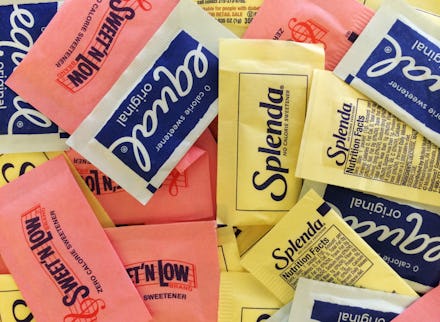The truth about artificial sweeteners might make you sick

Put down the the Splenda, Stevia and Equal packets for a minute and just listen. Yes, it’s true, sugar isn’t good for us — but scientists recently reviewed more than 11,700 studies and came to the conclusion that artificial sweeteners may not be any better.
Considering that two-thirds of all adults in the U.S. are overweight and about one-third are obese, many Americans are interested in shedding a few pounds. Some turn to aspartame, sucralose or other artificial sweeteners to satiate their sweet tooth while losing weight. And in general, more Americans are ingesting artificial sweeteners than ever— one study, for example, suggested that American children’s consumption of artificial sweeteners went up by 200% from 1999 to 2012. For adults, that increase was around 54%.
The term “artificial sweeteners” encompasses a shortlist of chemicals sold under commercial names. Aspartame, for example, is often marketed under the brand names Nutrasweet, Equal or Sugar Twin, according to the FDA. Sucralose — which is about 600 times sweeter than sugar — is generally known as Splenda.
Regardless of the brand name, scientists conducted a meta analysis on about 37 specific white papers about sweeteners with little nutritious value. The meta-analysis collectively suggested that zero-calorie artificial sweeteners have little to no positive effect for overweight people, people with diabetes or those with hypertension (high blood pressure). In others, these sweeteners could actually be harmful: Weight gain, type 2 diabetes, high blood pressure, heart disease and stroke were all potential risks.
“Overall, the evidence does not support the intended purpose of weight loss and suggests that there might be adverse effects in the long term,” Meghan Azad, an author of the review and assistant professor at the University of Manitoba, told LiveScience.
But nothing is certain at the moment. There is no absolute conclusion that artificial sweeteners are harmful for everyone, and each individual study is limited by its own experimental design. With that said, they’re probably not the best option for people trying to drop some weight, and scientists in general aren’t exactly recommending that the rest of the world eat them, either.